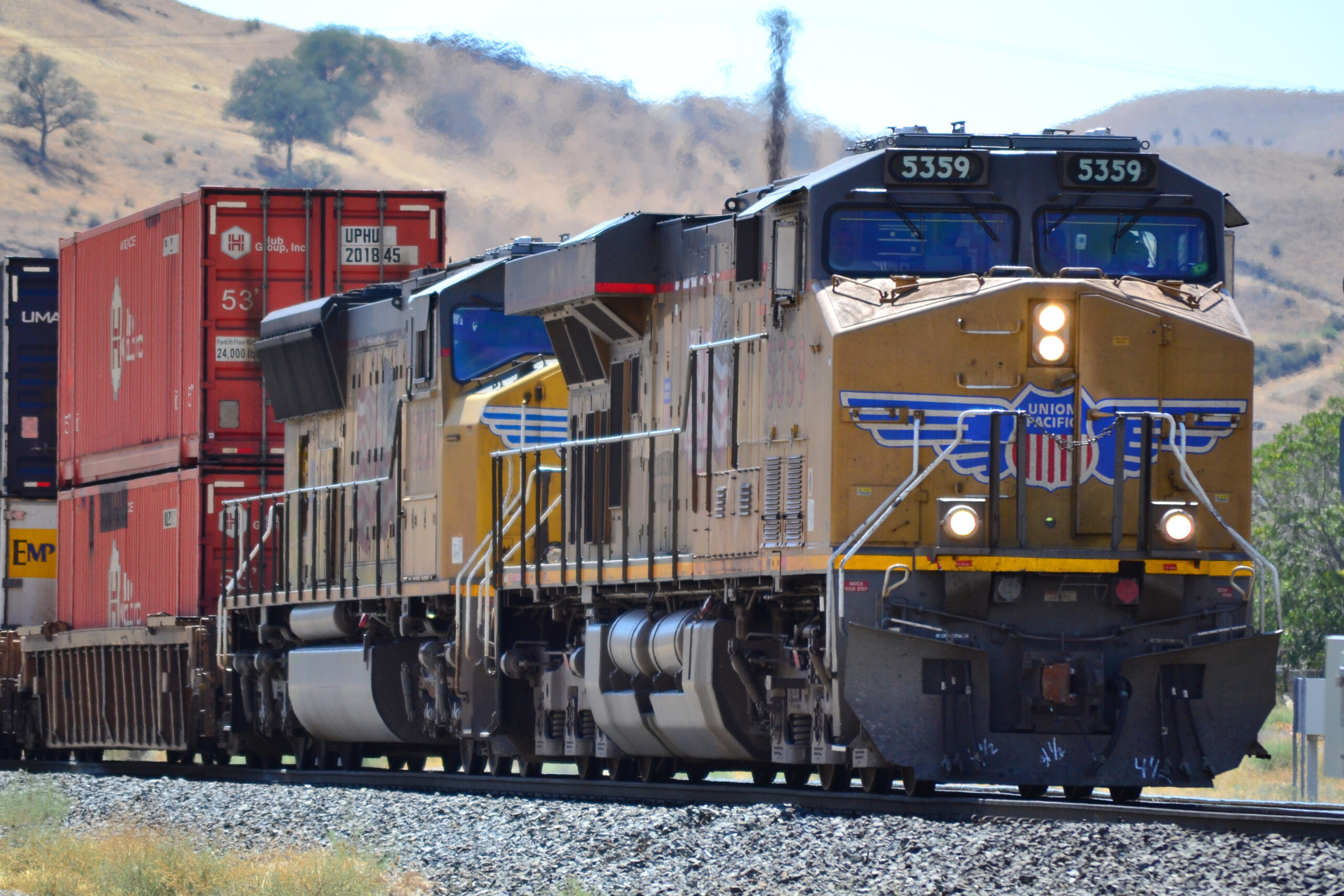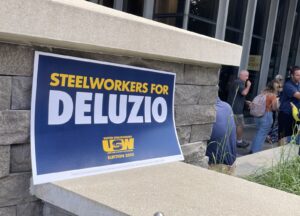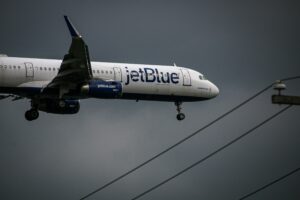By David Moore, Sludge
Update, Mar. 15: One of the largest U.S. railroad companies, BNSF, contributed $2,500 from its PAC to Republican Rep. Sam Graves of Missouri after last month’s train derailment in Ohio, according to a just-released FEC report. Graves is the chairman of the House Committee on Transportation and Infrastructure, which has jurisdiction over transit and rail transportation. In the 2022 election cycle, Graves was the number one recipient of railroad industry cash among all U.S. House members, according to OpenSecrets. The company BNSF, which since 2010 has been a subsidiary of conglomerate Berkshire Hathaway, is a member of top industry lobbying group the Association of American Railroads (AAR), to whose PAC it contributed $5,000 last month.
The $2,500 contribution BNSF made on Feb. 22 matches the total the company donated to Graves’ campaign in the midterm elections cycle. Less than a week after BNSF’s donation, Graves and fellow Republican Rep. Troy Nehls of Texas, who chairs the subcommittee overseeing railroads, sent a letter launching an inquiry into the Environmental Protection Agency’s response to the train derailment in East Palestine, Ohio. Graves told Fox News last month he was in no rush to consider rail safety legislation, however, saying he wanted to “fully understand the facts involved” and wait for the National Transportation Safety Board to report on the incident.
BNSF spent nearly $2.8 million on federal lobbying last year, up from the $2.5 million it spent in 2021, touching on “Issues pertaining to Railroad Safety.” From 2013 through 2020, BNSF regularly reported lobbying on versions of the Safe Freight Act, a bill that would require a train crew consisting of at least two individuals. Railroad industry trade association AAR says the minimum crew staffing measure “lacks a safety justification.”
According to a report in OpenSecrets News, BNSF was the number one political contributor in the rail industry to state candidates last year, totaling $6.8 million, and has been the number one spender on state lobbying among railroad companies, spending $12.7 million since 2003.
Facing a push in Congress for stronger rail safety rules after the disastrous train derailment in East Palestine, Ohio, railroad giant Union Pacific, a member of the rail industry’s top lobbying group, is steering its donations to Republican lawmakers—some with oversight over the federal response and rail safety issues.
New disclosures reveal that Union Pacific’s PAC made $15,000 in contributions last month, all to Republicans in the House and Senate, given less than two weeks after the Ohio derailment. The donations came after Union Pacific spent $4 million on lobbying last year, according to Senate records, an increase over each of the previous two years, as part of an industry-wide effort to weaken rail safety regulations.
This month, Senate lawmakers introduced a bill, the Railway Safety Act, that would enhance safety requirements for trains carrying hazardous materials and increase fines for safety violations, but the proposal is already facing stiff resistance from Republicans. The number two ranking Republican, John Thune of South Dakota, quickly expressed opposition to the bill, seeking to throw cold water on a response “heavy on regulation.”
Several House Republicans on committees that oversee transportation have sought to delay the bipartisan legislation to boost rail safety rules as well, saying more information is needed after a potentially-lengthy study. The rail industry’s top lobbying group, the Association of American Railroads (AAR), told The Hill that the bill’s safety requirements would not have prevented a crash like the one on Feb. 3 by its member company Norfolk Southern’s train.
Yesterday, Union Pacific, one of the largest rail companies in the U.S., released a report of its political giving to federal lawmakers following the train derailment in Ohio, the first such disclosure by a major rail company belonging to the AAR. On Feb. 15, Union Pacific contributed $8,000 to House Majority Leader Steve Scalise (R-La.), consisting of $5,000 to his campaign and $3,000 to his leadership PAC Eye of the Tiger. In the weeks after the derailment, House Republicans on the Oversight and Reform Committee announced an investigation into the Department of Transportation’s response to the train crash, accusing the Biden administration of being slow to address the crisis and send officials to visit the area.
Last year, Union Pacific paid nearly $792,000 in dues to AAR, making up just a portion of the company’s influence spending in Washington, D.C. In recent years, Union Pacific, along with Norfolk Southern and AAR, has led the rail industry’s lobbying push against a Federal Railroad Administration (FRA) “train staffing” proposal proposed by the Biden administration’s Department of Transportation last year. The measure, which is also included in the Railway Safety Act, would require most trains, particularly those with hazardous cargo, to have at least two crew members on board. Union Pacific stated its opposition to a previous version of the bill, the Safe Freight Act, introduced in the House by the late Rep. Don Young (R-Alaska), in a 2020 lobbying report.
Union Pacific, which the FRA categorizes as one of the Class I rail carriers, along with other AAR member companies like Norfolk Southern and BNSF, donated $5,000 to the leadership PAC of Sen. Mitt Romney (R-Utah). Early this month, Romney slammed Transportation Secretary Pete Buttigieg as “not ready for the responsibility he has” in managing the DOT’s response to the derailment. Among other roles, Romney sits on the Senate subcommittee with jurisdiction over worker health and safety, wage and hour laws, and workplace flexibility.
Last month, Union Pacific’s PAC also contributed $1,000 each to Republican Reps. Tom Cole of Oklahoma and Garret Graves of Louisiana. On the House Committee on Appropriations, Cole chairs the Subcommittee on Transportation, Housing, and Urban Development, which has jurisdiction over federal spending that goes to the National Railroad Passenger Corporation and the National Transportation Safety Board, which is newly investigating Norfolk Southern’s safety practices. Louisiana’s Graves, who represents a congressional district that includes most of Baton Rouge, is a member of the U.S. House Transportation and Infrastructure Committee that oversees transit and rail transportation. Graves is the second-ranking Republican on a subcommittee that oversees agencies like the Federal Emergency Management Agency (FEMA), which sent resources to help in East Palestine, and other federal responses to emergencies and natural disasters.
Union Pacific’s $4 million spent on federal lobbying in 2022 touched on a host of rail safety issues, including in the fourth quarter of last year on the “movement of dangerous or HazMat by rail,” “national rail-labor negotiations under the Railway Labor Act,” and “railroad employee attendance policy.”
The Omaha, Nebraska-headquartered Union Pacific has been among the biggest political donors among rail companies, according to OpenSecrets, part of the industry’s extensive lobbying efforts on safety mandates. The height of the railroad industry’s spending on lobbying over the past two decades—totaling $653.3 million—came between 2008 and 2012, when the industry weighed in on an act seeking to enforce antitrust laws on freight railroads, according to an OpenSecrets analysis. Last cycle, Union Pacific’s PAC doled out $1.8 million in donations, favoring Republican candidates.



